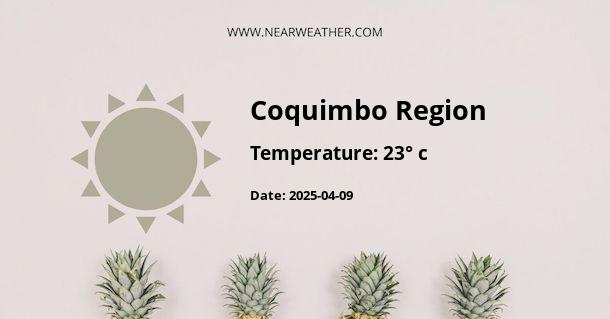Climate and Weather in the Coquimbo Region, Chile
The Coquimbo Region is located in the north-central part of Chile, and it is known for its diverse climate and unique weather patterns. The region's location between the Pacific Ocean and the Andes Mountains contributes to its varied climate, which ranges from arid desert conditions to Mediterranean-like weather. Understanding the year-round climate and weather of the Coquimbo Region is essential for residents, visitors, and businesses operating in the area.
Seasonal Variation
The Coquimbo Region experiences distinct seasonal variations that significantly impact its climate and weather patterns. The region generally has a dry climate, but the presence of the Pacific Ocean and the Andes Mountains influences temperature, precipitation, and wind patterns throughout the year.
Summer (December to February)
During the summer months, the Coquimbo Region experiences warm to hot temperatures, with an average high of around 26°C (79°F). The coastal areas benefit from the moderating influence of the Pacific Ocean, resulting in milder temperatures compared to the inland valleys and mountainous areas. The region receives minimal rainfall during this time, contributing to its arid climate.
Autumn (March to May)
Autumn brings cooler temperatures to the Coquimbo Region, with average highs ranging from 20°C to 25°C (68°F to 77°F). The transition to autumn is marked by decreasing daylight and subtle changes in vegetation across the region. While precipitation remains low, occasional rainfall may occur, particularly in the coastal areas and higher elevations.
Winter (June to August)
Winter in the Coquimbo Region is characterized by mild temperatures, with average highs ranging from 15°C to 20°C (59°F to 68°F). The coastal areas experience relatively stable temperatures, while the interior valleys and mountainous regions may see cooler conditions. Rainfall is more likely during winter, especially in the form of sporadic showers and drizzle.
Spring (September to November)
Spring marks a transition to warmer temperatures in the Coquimbo Region, with average highs gradually increasing from 20°C to 25°C (68°F to 77°F). The region experiences a renewal of vegetation and increased daylight hours, creating favorable conditions for outdoor activities. Precipitation remains low during spring, contributing to the region's overall arid climate.
Precipitation and Wind Patterns
The Coquimbo Region is known for its limited precipitation, with the coastal areas receiving minimal rainfall throughout the year. The presence of the Andes Mountains influences precipitation patterns, leading to higher rainfall in the mountainous areas compared to the coastal plains.
The region also experiences distinct wind patterns, with the influence of the Pacific Ocean contributing to cooling breezes along the coast. Inland areas may experience stronger winds, especially in the valleys and canyons, creating localized variations in weather conditions.
Climate Zones
The Coquimbo Region encompasses several climate zones, including arid, semi-arid, and Mediterranean climates. The coastal areas exhibit Mediterranean-like conditions, characterized by mild, wet winters and warm, dry summers. Inland areas, particularly towards the Andes Mountains, feature arid and semi-arid climates with limited precipitation and wide temperature ranges.
Extremes and Natural Phenomena
The Coquimbo Region is susceptible to natural phenomena such as droughts, heatwaves, and occasional heavy rainfall events. Droughts are a common occurrence in the arid and semi-arid areas, impacting agriculture and water resources. Additionally, the region experiences occasional heatwaves during the summer months, leading to high temperatures and increased demand for cooling resources.
Conclusion
In conclusion, the Coquimbo Region in Chile showcases a diverse climate and weather patterns throughout the year. From the arid desert conditions to the Mediterranean-like climate along the coast, the region offers unique environmental characteristics that shape the way of life for its residents and the experiences of its visitors. Understanding the seasonal variations, precipitation, wind patterns, and climate zones is essential for anyone looking to explore or establish roots in this captivating region.
A - Coquimbo Region's Latitude is -30.750000 & Longitude is -71.000000.
A - Weather in Coquimbo Region is 25° today.
A - Climate Conditions in Coquimbo Region shows overcast clouds today.
A - Humidity in Coquimbo Region is 42% today.
A - Wind speed in Coquimbo Region is 9.07 km/h, flowing at 279° wind direction. today.
